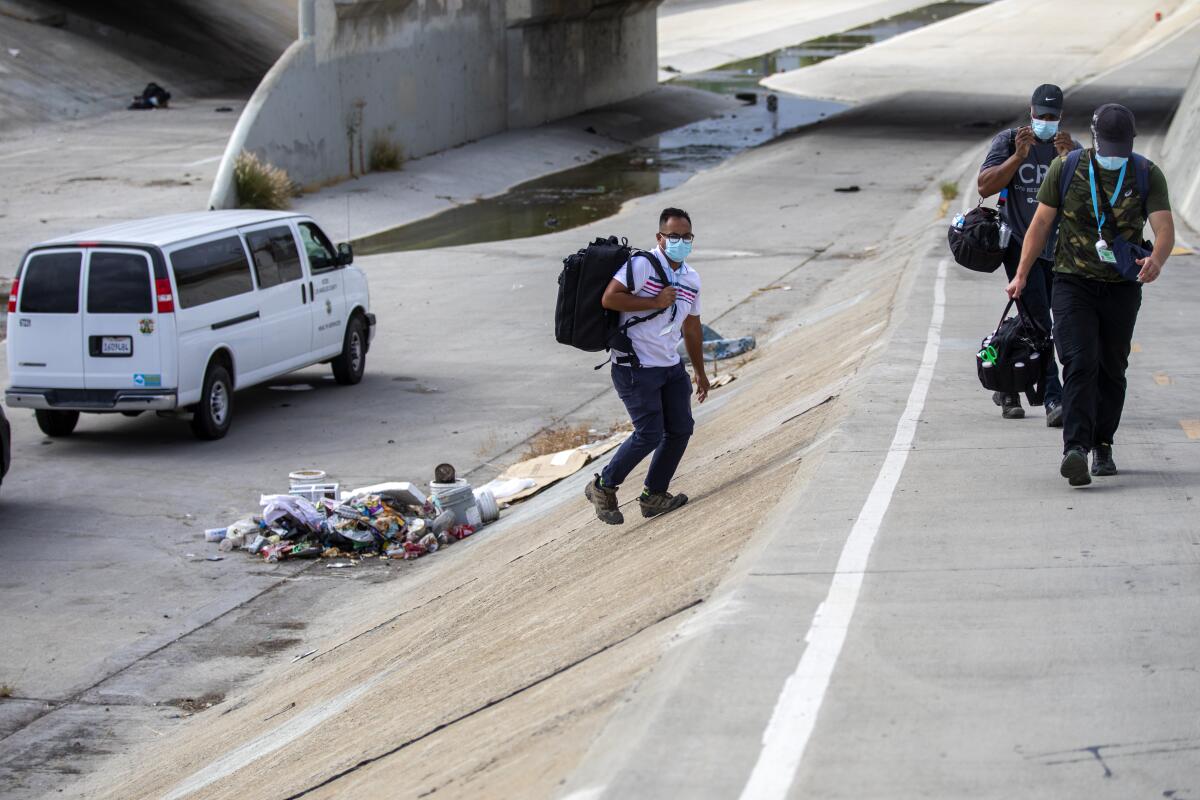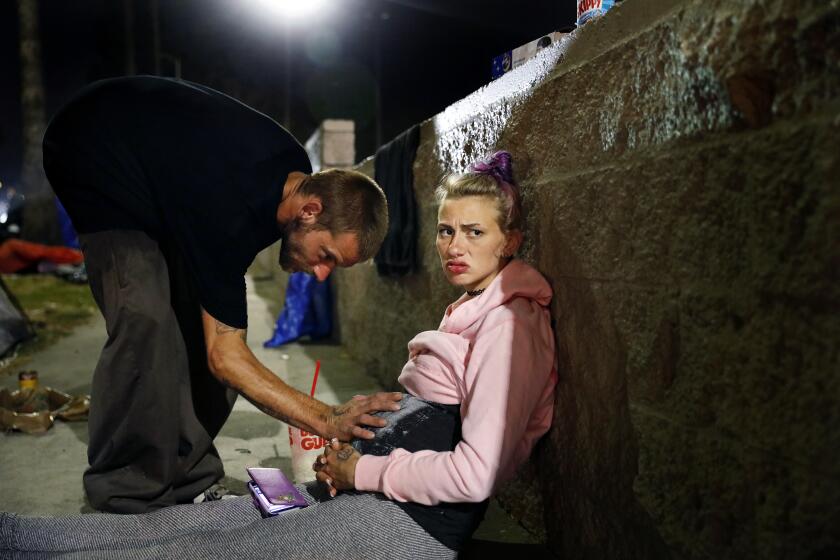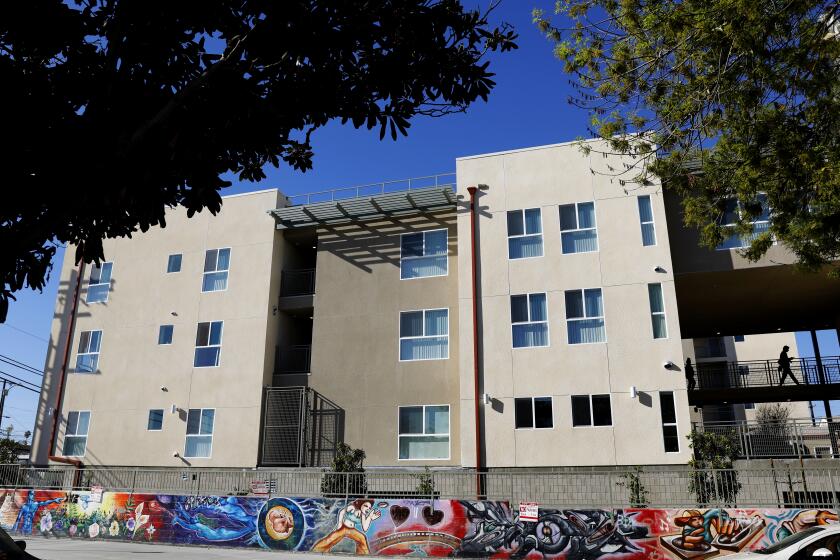Editorial: If homeless women have trouble getting contraception, why not bring it to them?

- Share via
Mckenzie Trahan, the young homeless woman whose struggle to raise her newborn was chronicled in a series of stories in the Los Angeles Times, had nothing but determination going for her when she got pregnant. Born into poverty, in and out of foster care and juvenile hall, on and off meth, she moved into an apartment in a transitional housing program for young mothers and tried valiantly to make a life for herself and her daughter.
Even with the help of well-intentioned people, navigating a system riddled with obstacles was too difficult to overcome, and her daughter was removed from her care. Permanent housing subsidies are complicated to apply for (though she did eventually get one). Trahan met weekly with a drug counselor, but there was no daily on-site substance abuse or mental health counseling available in her transitional housing program. Jennifer Hark Dietz, the chief executive of PATH, the service provider organization that ran the housing where Mckenzie lived, said she would love to have those programs available on-site, but the funding doesn’t cover that.
Mckenzie’s journey illustrates what a daunting task it is to transition from a life of homelessness into housing, while trying to stay sober and overshadowed by a history of trauma including domestic violence. The system that brought her in from the streets ultimately failed her, requiring what turned out to be an impossible juggling act of adjusting to a housing program with rules, caring for an infant, looking for work and permanent housing, and staying sober.
But in a homeless services system rife with complexities and problems, one specific and straightforward thing L.A. County could do is offer more and better reproductive healthcare for homeless women where the priority is survival, not getting to a clinic for a checkup and birth control.
In an encampment above the Hollywood Freeway, nothing about Mckenzie Trahan’s future is certain.
According to studies, it’s not rare to find homeless women pregnant living on the streets. Among unhoused women ages 18 to 25, 44% are pregnant or mothers, according to a research group at the University of Chicago.
But for women with Mckenzie’s background, “homelessness and motherhood are often less a decision than a destiny,” writes Gale Holland, the Times reporter who created the series along with videographer Claire Hannah Collins and photographer Christina House.
A new Los Angeles County effort could help young homeless women and people who don’t identify as female but are capable of getting pregnant have more agency over their reproductive lives.
The county’s Housing for Health division of the Department of Health Services will launch a program, probably within a month’s time, to bring mobile vans outfitted like clinics to encampments across the county. The 40-foot vans, each with two rooms with adjustable examination beds and privacy screens, will allow healthcare providers to do cervical exams, Pap smears, and prescribe and insert IUDs and other long-acting reversible contraception. In addition, the teams assigned to the vans will also deliver primary and urgent care, treat sexually transmitted infections, do ultrasounds and EKGs.
Some of this care is already administered by county street medicine teams that treat people living in hard-to-reach encampments, offering primary care, medicines to curb drug cravings and treat overdoses as well as give out condoms. But the vans will allow for a wider array of services. “We want to provide more options,” says Absalon Galat, the family medicine doctor who will run the new mobile clinic program. With the addition of the vans, teams of providers will now be able to offer reproductive care usually available only in brick-and-mortar clinics. The teams will also offer and prenatal care to pregnant women.
Editorial: The only way out of homelessness is permanent housing. That’s why we need the HHH program
HHH housing is taking a long time to build, but the city’s housing bond program is not a failure.
The larger mobile vans will accommodate women’s reproductive healthcare in a way that wasn’t possible before, according to Galat, who also ran the county’s COVID response medical teams that went out to encampments to test and vaccinate for the coronavirus as well as provide other medical care.
It’s great that the county is expanding its mobile healthcare options for homeless people because some are unable or reluctant to go to a clinic, fearing they will be treated disrespectfully because they are homeless.
Initially there will be four vans divided across regions of the county making regular trips to different locations every two weeks. Galat envisions expanding the services to include physical therapy, cognitive assessment, and treatment of complications of drug use such as endocarditis. And he would like to get a high-risk obstetrician/gynecologist on board to treat pregnant women with a history of drug use. If this effort is successful and well-used, the county should increase the number of vans.
Then, for homeless people, maybe getting pregnant can be a choice, not just an inevitability.
More to Read
A cure for the common opinion
Get thought-provoking perspectives with our weekly newsletter.
You may occasionally receive promotional content from the Los Angeles Times.












